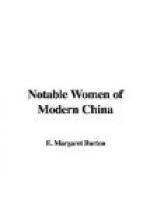This was only one of many cases of need which the hospital sought to alleviate. A few days after Christmas of this year Dr. Stone wrote to a friend in America: “What a busy time we had getting ready to celebrate the joyful event! We gave a good square meal to the refugees, and let them take home what they could not finish here. It made me feel happy to see them so pleased, and gave us an opportunity to tell them of the greatest Gift to mankind. Although we were so rushed that we did not even sit together to eat our regular meals, yet we felt it was the happiest Christmas we have ever had.”
In addition to the refugees larger numbers of regular patients than ever before were coming to the doctors for treatment. The new hospital had hardly been opened before Miss Howe wrote, “Patients who are able to bear their own expenses are being sent away, because the present accommodations are already overtaxed.”
Just at this time, when the doctors’ growing reputation, and the increased facilities which the new buildings afforded, were greatly enlarging both opportunity and responsibility, the question of Dr. Kahn’s going to Nanchang to open medical work there arose. It is not surprising that at first Dr. Stone wondered how she could spare her friend and fellow-worker, now that the work was greater than ever before, and every indication pointed to large growth in the future. But when she became convinced that the opportunity at Nanchang was too great to be neglected, and that only Dr. Kahn could meet it, she bade her God-speed and cheerfully accepted the added burden thus laid upon her.
Left alone with the entire work in Kiukiang, Dr. Stone’s hands were full indeed, as the answer which she gave to a request for a synopsis of her day’s work shows: “We breakfast at half-past seven and then I go to the chapel in the hospital and conduct prayers for the inmates and patients able to attend. After prayers I make a general inspection of the hospital, and then I teach my class of nurses. I take young native girls in their teens and give them a thorough course of training such as they would get in America. I translate the English books into Chinese for them, and sometimes put the Chinese books into English too. Then I go to the dispensary and am busy there for hours.... In the afternoons I make calls, generally on women of rank who need my assistance and have been unable to get to the hospital. I return home only when here seems no further work for me that day.”
So far from decreasing in number after the medical force had been lessened by half, the stream of patients became larger than ever. A few weeks after Dr. Kahn had gone, Dr. Stone said, in a letter to Dr. Danforth: “For a long time I have been wanting to write to you, but have been so pressed with work that I had to let my correspondence suffer. Now I find that I must write to you to let you know how crowded we are already, at this season when we generally have




